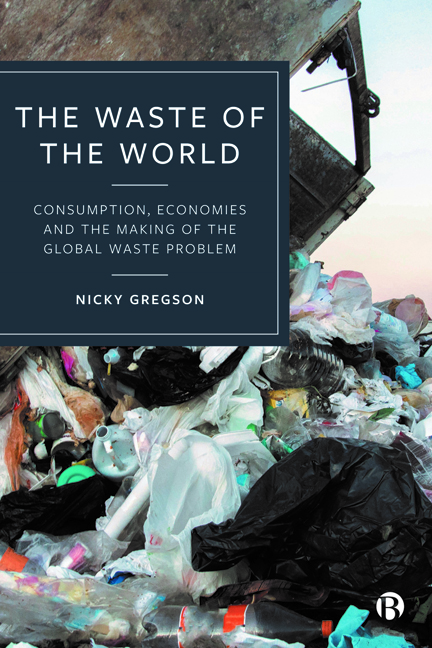Book contents
- Frontmatter
- Contents
- Acknowledgements
- Preface
- 1 The Global Waste Problem and How to Think about It: Or, how to understand the ‘too much waste’ problem
- 2 Discard, Social Order and Social Life: Or, discard is foundational to understanding waste
- 3 Consumption, Consumer Practices and Consumer Discard: Or, how consumer discard relates to economies
- 4 Conduits, Value Regimes and Valuation: Or, following consumers’ discarded things
- 5 Recommodifying Discard: Or, the challenges of turning discard into an economic good
- 6 Waste, Money and Finance: Or, how turning discard into waste turns waste into an energy resource and an asset
- 7 Future Directions: Or, rewiring waste through the three Ds (decarbonization, digital and discard)
- Notes
- References
- Index
Preface
Published online by Cambridge University Press: 18 January 2024
- Frontmatter
- Contents
- Acknowledgements
- Preface
- 1 The Global Waste Problem and How to Think about It: Or, how to understand the ‘too much waste’ problem
- 2 Discard, Social Order and Social Life: Or, discard is foundational to understanding waste
- 3 Consumption, Consumer Practices and Consumer Discard: Or, how consumer discard relates to economies
- 4 Conduits, Value Regimes and Valuation: Or, following consumers’ discarded things
- 5 Recommodifying Discard: Or, the challenges of turning discard into an economic good
- 6 Waste, Money and Finance: Or, how turning discard into waste turns waste into an energy resource and an asset
- 7 Future Directions: Or, rewiring waste through the three Ds (decarbonization, digital and discard)
- Notes
- References
- Index
Summary
This book is a synthesis of 30 years’ research. It's taken a while to write, not just because of the years involved but also because of what's at its core. Perhaps I was being a bit ‘slow’ but it took me a long time to realize that what I was working on was waste. Seemingly, I’m not alone. In 2020, I was interviewed by the editors of a handbook on waste scholarship in the social sciences, to help frame one of their introductory chapters.1 One of their questions was, ‘tell us how you got into researching waste’. Like the others they asked that same question to, my answers turned out to be very much of the type, ‘I never really set out to look at waste’. I find that fascinating and instructive. It points to the elusive qualities of certain types of waste research. It also forewarns that interesting things start to happen to understandings of waste when the starting point isn't waste.
It is, of course, important to recognize that a great deal of academic research starts from waste. There is a huge body of scientific and technical work focusing on what is – or, I would argue, appears to be – self-evidently waste – material, physical stuff that needs to be either managed as waste or manipulated to become something that is not waste. Then there is the social scientific work that starts with waste. Although nothing like the size of the scientific-technical field, this is now a substantial literature. Mostly, it has looked at people in proximity to waste and the effects of that proximity. They are typically injustices and inequalities, be they the health inequalities that come from living and/or working alongside certain wastes or the socioeconomic causes and consequences of working with it. Another strand of social scientific research starts from waste as an environmental concern and addresses the governance and governing of waste. What unites these two strands of social scientific work is their passive positioning of waste.
- Type
- Chapter
- Information
- The Waste of the WorldConsumption, Economies and the Making of the Global Waste Problem, pp. vii - xviiiPublisher: Bristol University PressPrint publication year: 2023

